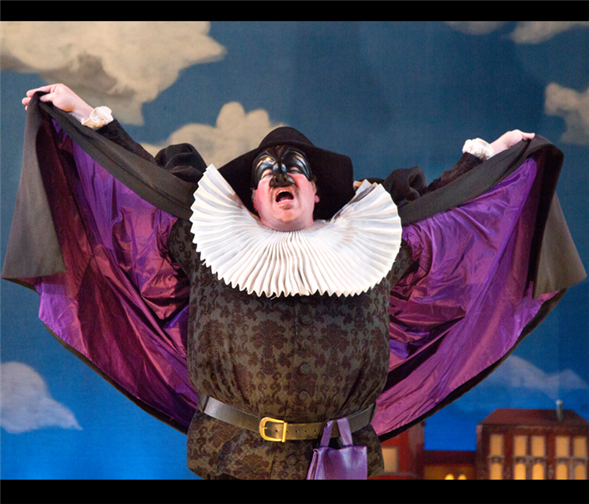Translate Page

A comedy expert directs a commedia classic
---
How do you make the centuries-old techniques of commedia dell'arte work on stage in 2016?
"The trap of it is to think of it as something that has an antique style, something that isn't alive anymore," says Christopher Bayes. And he should know. He has a long history with professional clowning and movement-based theatre, and he's directing Theatre for a New Audience's production of The Servant of Two Masters, Carlo Goldoni's commedia classic from 1746. (The show runs through this weekend at the Polonsky Shakespeare Center in Brooklyn.)
"Unless you take the legacy [of the style] into the present moment, it's not going to be true commedia," says Bayes. "If you're not sourcing the news today, or at least having the appetite to investigate that, it's not alive. The key is to be able to work with people who understand how to do it."
That's the case in this production, which uses Constance Congdon's adaptation of Christina Sibul's translation. It received its premiere at Yale Repertory Theatre (Bayes is the head of physical acting at Yale School of Drama), and it later played in Seattle, Boston, and Washington, D.C.
For this production, the script was further enhanced in rehearsal by Bayes and the actor Steven Epp. Epp stars as Truffaldino, a servant who's so hungry he takes two jobs to survive. This leads to all sorts of hijinks, which are enhanced by improvised jokes and shenanigans.
Epp and Bayes have been working together for over 32 years, when they were part of the Minneapolis-based physical theater troupe Theatre de la Jeune Lune. "Now we're different parts of each other's brain," says Bayes. "There's a deep trust between us. He's fearless. It's like what Lucille Ball said, and I'm paraphrasing: 'It's not that I'm funny. It's that I'm brave.' When you're in the center of a comic world, it demands that you play without worry, without fear."
That fearlessness has always been part of this show. As Bayes points out, Goldoni gave a basic scenario to his acting company, then had them add their own comic inventions. "To keep it alive, we're giving it back to the actors," Bayes says.
{Image1}
To that end, the performers freely dip into the contemporary cultural, social, and political zeitgeist. He calls this troupe – composed principally of his former students from Yale, N.Y.U., and Brown University/Trinity Rep – "the lopsided caravan of misfit toys."
What advice would he give other artists attempting commedia, which relies on creating clear comic characters while also inventing jokes on the spot?
"Theres a huge craft to it," Bayes sayes. "But I think the most important thing is follow the game as far as it can take you. I also tell my students there's not a better game than the one that's happening between the characters on stage: one character is trying to get away with something, another is trying to interrupt the other, yet another is trying to make up things on the fly so he doesn't get into trouble. So how does that game play itself out?"
Mask work is also integral to this production and other commedia pieces. "It's important for the actors to understand and find the physical psychology of each archetypical mask and to play it from underneath," Bayes says. "If you do commedia you have to understand how the masks work and why they were essential to the work. The scale that the masks demand physically, in the vocal power of the actors, in their playfulness – all that stuff."
Still, Bayes stresses that nuanced acting is at the core of this work. "For me, the poetry of commedia is more interesting than the comedy," he says.
In The Servant of Two Masters, that poetry is supported by two on-stage musicians -- Christopher Curtis and Aaron Halva – who also wrote the show's music.
"[Their music is]the thing that allows you to bring in tragedy more easily, as well as the poetic," Bayes says. "People come expecting [commedia] is going to be a certain thing and that allows you to surprise them by bringing something more tragic and melodramatic, in the best way. For me, it's trying to find the tragedy and the poetry in a comic world. If you can make someone cry at the end of a comedy, you've done your job very well."
---
Follow Frank Rizzo at @ShowRiz. Follow TDF at @TDFNYC.
Photos by Henry Grossman. Top photo: Andy Grotelueschen.
TDF Members: Go here to browse our discounts for theatre, dance, and concerts.